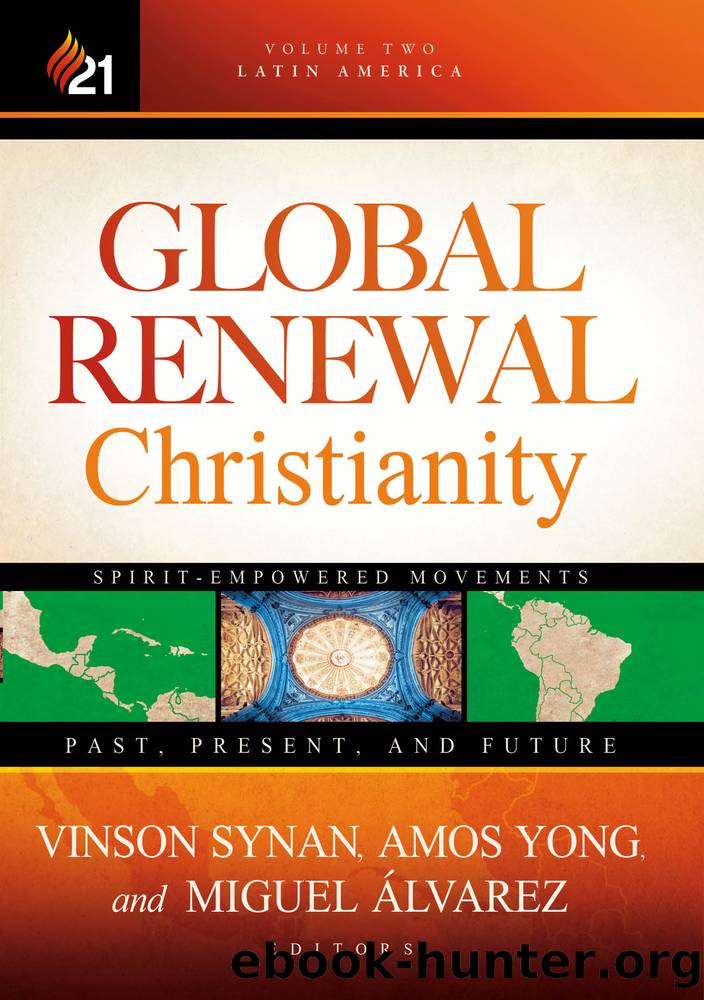Global Renewal Christianity: Latin America Spirit Empowered Movements: Past, Present, and Future (Global Renewal Christianity; Spirit-Empowered Movements: Past, Present, and Future) by Necunoscut(ă)

Author:Necunoscut(ă)
Language: eng
Format: mobi
Tags: Religion, Christianity - Pentecostal & Charismatic
ISBN: 9781629989297
Publisher: Charisma House
Published: 2016-05-03T00:00:00+00:00
Chapter 14
Some Remarks on Brazilian Pentecostal Scholarship
Paulo Ayres Mattos
THE DIVERSITY AND syncretistic religiosity of the Brazilian people is widely known. However, elements of the Brazilian religious landscape are neither a recent invention nor even a reinvention of something forgotten in the past. Both derive from a history that, through a very complex dialectical process of interpenetration and accommodation of various Portuguese, Native, and African traditions, has shaped the formation of Brazilian folk religions. It is within this context that the Brazilian Pentecostal movement must be considered, discussed, and criticized.
If in the last thirty years, Brazilian Pentecostalism has become influential in almost every sector of national life, traditional prejudices against theological formal education are still strong among many of those in the movement. However, the last decades have seen the emergence of a generation of scholarly, educated Pentecostal theologians who are raising some crucial and even embarrassing theological questions for their churches. However, despite the astonishing growth and influence of Brazilian Pentecostalism at home and abroad, these Brazilian Pentecostal scholarly voices have been largely unknown to the worldwide academy.
This essay suggests why these perspectives deserve more attention and consideration, particularly from Pentecostal scholars outside the Brazilian field. In addition, it introduces some of the Brazilian Pentecostal theologians who are struggling to understand (with academic rigor) the meaning and relevance of Pentecostal experience and theology in the pluralist Brazilian context. The first section is a short introduction to the historical development of Brazilian Pentecostalism, and the second introduces some of the Pentecostal theologians whose research and publications seriously consider the missional and theological challenges faced by this national movement. Particular attention is paid to those working inside the complex and diversified arena of the Brazilian Assemblies of God.1
A BRIEF SKETCH OF THE DEVELOPMENT OF BRAZILIAN PENTECOSTALISM
Four years after the Azusa Street revival began in Los Angeles, Pentecostalism arrived in São Paulo, in March 1910, through Luigi (Louis) Francescon (1866â1964), an Italian immigrant in the United States. Months later, Gunnar Vingren (1879â1933) and Daniel Berg (1884â1963), two Baptist immigrants from Sweden in the United States, arrived in Belém do Pará. They were part of the same voluntary missionary enterprise that many early Pentecostals carried overseas at the very beginning of the North American Pentecostal revival. Within a few years, their noninstitutional, nonecclesiastical, and nonbureaucratic lay and practically voluntary missionary work had established strong congregations throughout Brazil under the flags of the Christian Congregation in Brazil and the Assemblies of God.2
When they arrived in Brazil, those men went to congregations of their own North American denominationsâthe Italian to the Presbyterians and the two Swedes to the Southern Baptists. They experienced rejection and ejection similar to that experienced by the first American Pentecostals. Although, generally speaking, Protestant missions brought the gospel message together with the ideology of the North American middle class, these three European immigrants, who belonged to very poor and excluded communities in their homelands, focused their missionary work among marginalized sectors of the Brazilian society. In the early twentieth century, these were
Download
This site does not store any files on its server. We only index and link to content provided by other sites. Please contact the content providers to delete copyright contents if any and email us, we'll remove relevant links or contents immediately.
| Baptist | Book of Common Prayer |
| Calvinist | Episcopalian |
| Inspirational | Lutheran |
| Methodist | Pentecostal & Charismatic |
| Presbyterian | Quaker |
| Seventh-Day Adventist | Shaker |
| Theology |
Fangirl by Rainbow Rowell(9229)
How to Bang a Billionaire by Alexis Hall(8146)
Wonder by R. J. Palacio(8098)
The Thirst by Nesbo Jo(6932)
The Space Between by Michelle L. Teichman(6932)
Assassin’s Fate by Robin Hobb(6200)
Wiseguy by Nicholas Pileggi(5770)
The Night Circus by Erin Morgenstern(5217)
Paper Towns by Green John(5179)
The Kite Runner by Khaled Hosseini(5170)
Bittersweet (True North #1) by Sarina Bowen(4843)
Gerald's Game by Stephen King(4642)
Too Much and Not the Mood by Durga Chew-Bose(4338)
Pillow Thoughts by Courtney Peppernell(4272)
Goodbye Paradise(3802)
Twelve Days of Christmas by Debbie Macomber(3559)
Good by S. Walden(3548)
The Rosie Effect by Graeme Simsion(3461)
The Cellar by Natasha Preston(3335)
